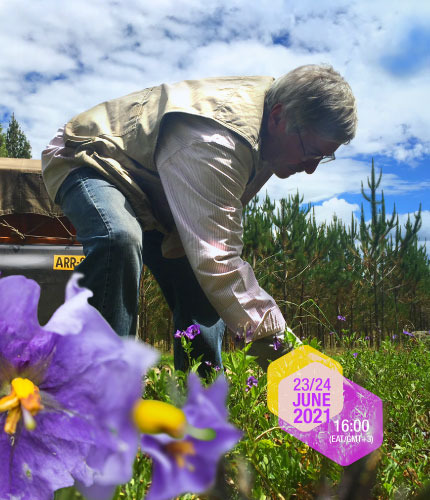Share to:

Use of potato wild relatives in pre-breeding for new genetic variability
Looking ahead the next 50 years, researchers and farmers have significant anxiety about continuing to produce enough food for the world’s growing population under the stressors of climate change. Crop wild relatives (CWR) of potato contain valuable traits that can be transferred to consumer varieties to help ensure reliable yields and high-quality potatoes to help shore up food and nutrition security for vulnerable families. Harvesting the valuable traits of CWR also requires that we preserve these valuable varieties to ensure their future use to strengthen our food systems.
This two-day panel discussion – sponsored by the International Potato Center and the Crop Trust – will explore the value and qualities of CWRs (day 1) and discuss how these varieties can be strategically deployed to support global food systems.
The discussion will be tailored to meet the interests of crop breeders, policymakers and crop science students.
MARIELA APONTE
Researcher
International Potato Center
MERIDETH BONIERBALE
Independent Consultant
DAVID DOUCHES
Professor in Plant, Soil and Microbial Sciences
Michigan State University
BENJAMIN KILIAN
Senior Scientist of Plant Genetic Resources
Global Crop Diversity Trust
HANNELE LINDQVIST-KREUZE
Senior Scientist and Division Leader of Crop Improvement
International Potato Center
NORMA MANRIQUE
Associate Scientist
International Potato Center
THIAGO MENDES
Potato Breeder
International Potato Center
MONICA SANTAYANA
Potato Breeder
International Potato Center
MARIA SCURRAH
Plant Breeder
Grupo Yanapai
Arione da S. Pereira is a researcher at the Brazilian Agricultural Research Corporation (Embrapa). And he is currently a collaborating professor at the Federal University of Pelotas, a research fellow of the National Council for Scientific and Technological Development, and Director of the Brazilian Potato Association (ABBA). His experience on potato breeding began in 1988 and for the last 18 years he has been leading the Embrapa’s program, being directly involved in the release of several cultivars for fresh market and processing. The focus of the program is cultivar development adapted to subtropical and tropical conditions. Priority traits for improvement are tolerance to heat, resistance to PVY, bacterial wilt and late blight, and quality of processing from storage.
ARIONE DE SILVA PEREIRA
Researcher
Embrapa
PAULINA SMYDA DAJMUND
Researcher
Plant Breeding and Acclimatization Institute (IHAR-Poland)
EDWIN VAN DER VOSSEN
Director of Research and Development
Solynta
AD VROLIJK
Program Leader in Hybrid Potato
HZPC
PAOLA GAIERO
Biologist
Universidad de la Republica, Uruguay
June 23 – The importance of CWR for potato breeding
Opening remarks
- Benjamin Kilian, Global Crop Diversity Trust
- Hannele Lindqvist-Kreuze, International Potato Center
- Thiago Mendes, International Potato Center
Potato pre-breeding case studies: Advances in potato pre-breeding
- Broadening the base of late blight resistance
- Thiago Mendes, International Potato Center
- PVS to select farmer-preferred varieties
- Maria Scurrah, Grupo Yanapai
- Breeding for bacterial wilt resistance
- Arione da Silva Pereira, Embrapa
Moderator: Merideth Bonierbale, Independent Consultant
Rapporteur: Mariela Aponte, International Potato Center
Conservation and use of CWR and pre-breeding germplasm
- CIP genebank and its work on conservation, availability and use
- Norma Manrique, International Potato Center
- How to increase the use of CWR and pre-bred germplasm
- Paulina Smyda Dajmund, IHAR-Poland
Moderator: Merideth Bonierbale, Independent Consultant
Rapporteur: Mariela Aponte, International Potato Center
Audience interaction and Q&A
June 24 – Utilizing CWR in breeding: Potential of potato CWR in a diploid inbred-based hybrid breeding strategy
Opening remarks
- Merideth Bonierbale, Independent Consultant
- Thiago Mendes, International Potato Center
Potato revolution: from clonal to seed crop
- Perspectives of hybrid breeding and CWR
- Ad Vrolijk, HZPC
- CWR in diploid hybrid versus traditional potato breeding
- David Douches, Michigan State University
Conservation and use of CWR and pre-breeding germplasm
- Biological challenges to the use of CWR in hybrid potato breeding
- Paola Gaiero, Universidad de la República
- Marker-assisted pyramiding of resistance genes in inbred parental lines
- Edwin van der Vossen, Solynta
Audience interaction, Q&A and closing remarks

